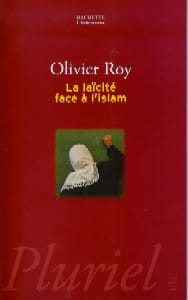A “hadith”, one of many sayings of the Prophet Muhammad, asserts: “Man is the enemy of what he does not know.” Therefore, we shall draw inspiration from this invitation, deeply Platonic in essence, to delve unreservedly into the deep waters of thought with Olivier Roy’s work, “Secularism Confronting Islam.”
From its introduction, the author wishes to share his unease about the “organized attacks” that Muslims, according to him, are subjected to. To the point of fostering in public opinion the idea of an “Islamic danger”, presented as a frontal threat to French identity. The author then engages in an analysis of secularism, sieving this concept through politics, law, philosophy, and history to ultimately arrive at this conclusion: Born out of controversy, as a “child of the divorce between the State and the Church” — the former seeking to free society from the influence of the latter — secularism can only be defined “in the negative”. It should not replace religious discourse “with a ‘new ethic’ or worse a new ‘ideology’”. It is impossible, even unnecessary, according to the author, to oppose it to Islam. Olivier Roy’s arguments are compelling at times, particularly when he discusses the identity crisis of French society revealed – “in a mirror,” says the author – by a possible communitarization of the country which would obviously favor the Muslim religion. His obvious attraction to the Anglo-Saxon or Nordic experience of communalism, however, is not tempered by the setbacks of the model in question, expressed by these countries in the Stasi Commission report on secularism.
We could also agree with his observation that a wide range of criteria – therefore debatable – define secularism, even if this somewhat quickly forgets the generally accepted understanding among defenders of the concept: the juxtaposition of all religions without any of them taking a predominant place in the republican state to the extent of challenging its fundamental principles. In this last point perhaps lies a key that might help better grasp the ambivalent perceptions of Islam. But Olivier Roy pretends to ignore it when he disputes the links capable of tying Middle Eastern Islam and the transposition of its influence into the suburbs. The organizers of the “Judeo-Muslim Friendship Bus”, recently in Nice, gave numerous examples of this. One of them spoke of the “two Frances”, that of the provinces where participants were generally well-received, and that of “Île de France and Paris” where they encountered more hatred modeled on the antagonism between Jews and Arabs of the Near East. The author almost abuses our naivety to the point of asserting that it is the “believer’s conscience” that dictates what belongs respectively to the religious and political spheres. Religious conscience above the law? It is equally difficult to follow him on another path: one that leads him to explain that Islam has “left” the Middle East because of secular political regimes (Tunisia, Egypt, Syria, or Algeria..) that hinder democracy because “they are distant from the Quran.” Not a word in this passage on Iran or Saudi Arabia. Olivier Roy finally mentions, as so many “possible proofs” of a modern, secular and reformist Islam, the school of “Mutazilites” and the thought of “Ijtihad” (Interpretation). If the first indeed sought to shake the Islamic dogmas in the 9th century, the proponents of this school of thought did not hesitate to use brutal methods, notably creating a form of inquisition (the “Mihna” inaugurated in 833) before disappearing in turn, a victim of a resurgence of fundamentalists. As for the “Ijtihad,” which allows an interpretation of the Quranic texts intended to facilitate their daily use by the faithful, this “attempt to reappropriate the Quran by the youth”, according to the anthropologist Malek Chebel, seems to face an “obscurantism” from the outside, vigorously denounced by the Rector of the Mosque of Paris. It has not, it seems, allowed Islam to overcome, since the end of its golden age, the “critical breakdown” mentioned elsewhere by Régis Debray.
One does not know whether to regret this or complain for the one who inspired, undisputed master, generations of students, including the author of these lines. But by trying to defend and convince at all costs, Olivier Roy’s usually so brilliant thought this time gives the impression of losing its acuity by becoming somewhat prisoner of its object of study.
Olivier Roy, Secularism Facing Islam, Coll. Pluriel, Hachette Literatures, 2006, 172 p., 7, 50 Euros
Jean-Luc Vannier
Psychoanalyst
Jlvannier@free.fr
06 16 52 55 20


